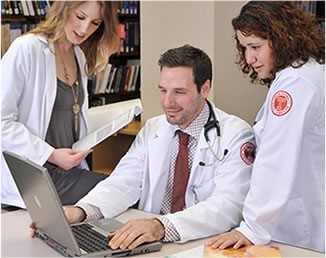

 Quality Awards
Quality Awards

The first library at St. Luke’s was established in the late 1880s when a bookcase containing reference books for the student nurses was placed in a hallway of the Victoria White Residence. The books were placed under the supervision of an instructor whose office was in the same hallway. In 1931 the first “real” library was established in the Bishopthorpe Nurses’ Residence. The Medical Library was founded in 1947 with donations from the Medical Staff and shortly thereafter a librarian was hired to supervise both the School of Nursing and Medical libraries. In 1995 the School of Nursing and Medical libraries combined into one facility as the W. L. Estes, Jr. Memorial Library.

The W. L. Estes, Jr. Memorial Library, the primary SLUHN library, is located in Lobby A of St. Luke’s University Hospital in Bethlehem and provides services to all network staff and students. Occupying over 7,400 square feet, Estes Library houses approximately 3,000 books, 170 current print journal subscriptions and provides access to numerous e-resources, including online journals, books and databases. In addition to an open stack and reading area, the library has a current journal room, 8 rooms for individual or small group study, copy room, and a computer room housing 19 networked desktop computers. Twenty additional desktop computers are available in the main library or side rooms. Wi-Fi is available throughout the Library.
St. Luke’s University Health Network (SLUHN) Libraries, composed of the W. L. Estes, Jr. Memorial Library, and St. Luke’s – Warren Campus Library, provide services to meet the knowledge-based information needs of the network. The libraries are staffed by 3 masters prepared librarians and are accessible to SLUHN staff and students on a 24/7 basis.
Services are designed to anticipate and be responsive to information needs for teaching, learning, research and patient care. In pursuit of this goal, the Library Services Staff is committed to responsive and outstanding customer services by delivering the highest quality information when, where and in the form needed; providing and maintaining high-quality, relevant and state-of-the-art resources; providing education to ensure effective use of information and information-gathering methodologies; and, striving to meet the individual information needs of each user.
The general public is invited to use library print materials for reference purposes by appointment only during regular library hours.
